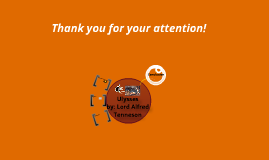Ulysses
Transcript: It little profits that an idle king, By this still hearth, among these barren crags, Match’d with an aged wife, I mete and dole Unequal laws unto a savage race, That hoard, and sleep, and feed, and know not me. Alfred Lord Tenneson Alfred, Lord Tennyson was born on August 5, 1809 in Somersby, Lincolnshire. Alfred began to write poetry at an early age in the style of Lord Byron. After spending four unhappy years in school he was tutored at home. Tennyson then studied at Trinity College, Cambridge, where he joined the literary club 'The Apostles' and met Arthur Hallam, who became his closest friend. Tennyson published Poems, Chiefly Lyrical, in 1830, which included the popular "Mariana". It wasn't till 1842 that he published "In Memoriam" which were the Books, "The Lady of Shalott", "The Lotus-eaters", "Morte d'Arthur" ,and "Ulysses" in the two-volume Poems that established his reputation as a writer. Ulysses An oft-quoted poem, it is popularly used to illustrate the dramatic monologue form. Ulysses describes, to an unspecified audience, his discontent and restlessness upon returning to his kingdom, Ithaca, after his far-ranging travels. Facing old age, Ulysses yearns to explore again, despite his reunion with his wife Penelope and son Telemachus. For much of this poem's history, readers viewed Ulysses as resolute and heroic, admiring him for his determination "To strive, to seek, to find, and not to yield".[1] The view that Tennyson intended a heroic character is supported by his statements about the poem, and by the events in his life—the death of his closest friend—that prompted him to write it. In the twentieth century, some new interpretations of "Ulysses" highlighted potential ironies in the poem. They argued, for example, that Ulysses wishes to selfishly abandon his kingdom and family, and they questioned more positive assessments of Ulysses' character by demonstrating how he resembles flawed protagonists in earlier literature. Summary "Ulysses" details Ulysses' intense dissatisfaction and boredom on his island home of Ithaca. The poem is a monologue spoken by him, where he not only expresses his discontent, but also describes his desire to keep sailing. He's getting older and doesn't have a lot of time left, so he wants to get busy living rather than busy dying. The poem concludes with his resolution to "strive, to seek, to find, and not to yield." In conclusion i believe that the submission and devotion of Ulysses through this entire story. Tells me how he not only enjoys travelling but also gets adapted to various things he comes across. He’s just not eager to explore but also eager to learn more, to gain more ‘knowledge.’ It is only when he is travelling that the ‘margin’ of the globe that he has yet not tread shrinks and tends to provoke him to go further and discover all that lies from one end of the horizon to the other QUIZ http://www.proprofs.com/quiz-school/story.php?title=ulysses_6 Conclusion Ulysses by: Lord Alfred Tenneson Thank you for your attention!

















